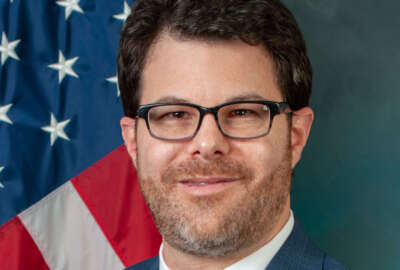
Federal contractors are already thinking about December 16, when the continuing resolution expires
Contractors are nervous about the continuing resolution the government is operating under since Saturday
Best listening experience is on Chrome, Firefox or Safari. Subscribe to Federal Drive’s daily audio interviews on Apple Podcasts or PodcastOne.
Contractors are nervous about the continuing resolution the government is operating under since Saturday. Perhaps more troubling is the expiration of the research and development tax credit of 100%. Now it’s back to 20%. And that has big ramifications, according to my next guest. David Berteau is president and CEO of the Professional Services Council, and he joined the Federal Drive with Tom Temin.
Interview transcript:
Tom Temin: And David we’ll get to the CR, such that it is, but this tax credit expiring, you are surprised you said to find how much it really matters to services contractors.
David Berteau: That’s right, Tom and 100% was available for about four years, it was in the Tax Reform Act passed back in the Trump administration. And it expired at the end of last year. And we’ve been arguing that it should be renewed. But most of the focus, first of all, most of the focus has been on the broader commercial companies across America, that spend research and development dollars, and want to deduct those. And from a DoD point of view and a federal government point of view, the focus has largely been on the big contractors with large research and development contracts. These are typically the big weapon systems, contractors, and other large companies. But what we have found at PSC, as we’ve been arguing for the renewal of that 100% tax deduction is that it also affects services contractors in ways that frankly, I was I wasn’t aware of, because we’ve always known that there are real advantages to process innovations and systems innovations in bringing improvements to the government. And it turns out those are eligible for the tax deduction under what’s called the qualified research activity, the QRA. But you know, many of those expenses are funded by operation and maintenance funds, not research and development funds, or even procurement funds. And so the tax credit can be claimed by a whole host of companies that we don’t typically think of as big research and development companies.
Tom Temin: That could then back up into the types of services and innovations the government itself gets from contractors.
David Berteau: Oh, absolutely. Because when a contractor proposes particularly on a cost plus, or cost plus incentive fee contract, when a contract proposes innovations built into their bid, that’s predicated upon their ability to meet cost and schedule, part of that cost is in fact, what they can deduct from their taxes. So if that is eliminated, it will put contractors in a position where they have to propose less innovation, and it’ll lead to less competition across the federal government.
Tom Temin: That’s interesting, because a lot of agencies, particularly defense agencies have been running challenge competitions, on route to maybe larger contracts. And the challenge competition would basically pay people the nominal fees anyway to develop new innovations under research and development types of activities.
David Berteau: Right. But developing these things is not a, you know, a one month or six month exercise. This is something that takes years of experience and investment across the board. And frankly, we haven’t seen much in the way of federal agencies weighing in on the extension of this R&D tax credit. Obviously, there’s not much time left, if it’s going to apply to this fiscal year or this calendar year for tax purposes, Congress is not going to be in much longer. So we’re encouraging the administration to weigh in on this as well as renewing our exchanges with Congressmen reinforcing the idea that it’s not just the large R&D companies, but in fact, it’s many of the services companies, including technology and IT companies that need the benefit.
Tom Temin: And watching what happened in Great Britain. Maybe Congress doesn’t dare touch the tax code in any way, shape, or form anymore, at least for the current couple of years.
David Berteau: Well, that’s beyond PSC’s purview. But it’s certainly been been a headline grabber.
Tom Temin: We’re speaking with David Berteau, president and CEO of the Professional Services Council. And that CR, we now know, goes through December 16. And then what? I guess that’s what contractors are actually looking at?
David Berteau: There’s three big questions with a continuing resolution, Tom. One is what’s the level it’s at. And this year, like many years, it’s just at the fiscal year ’22 level. So there’s no increase in funding. And this is particularly troubling, since we’ve had a lot of inflation over the past year. That wasn’t built into the FY22 appropriation. So a lot of companies have incurred dramatically increased costs in both their workforce and in their materials and supplies and transportation, etc. And none of that is covered under the CR. So even for ongoing work, there’s not enough funding available because no funding was increased. Of course, under a CR, there’s also no new starts, which means that all of the bids and proposals that were in that haven’t been awarded yet will be put on hold now for at least another two and a half months. And then the third issue is okay, what’s the end game? What happens then before we get to December 16? This is troubling for two reasons. One, of course, we have an election, and the outcome of the election may influence what members of Congress want to do. In fact, it may even influence which members of Congress will still be in office office after January 3, when the 118th Congress comes in. But more importantly, we don’t have agreement between the White House or between the House and Senate, or between the Democrats and the Republicans over what the level of spending should be for fiscal year ’23. We’re already in fiscal year 23, will be under a CR until December 16. But until we reach agreement on what those spending levels are, we can’t finalize the appropriations bill, which will probably be a big omnibus package of all 12 appropriations bills rolled into one. We can’t finalize that. So there’s at least a possibility that we’ll get to December 16. And we’ll see a yet another continuing resolution. It’s happened four times in the last seven years that we’ve gone well into the next calendar year, sometimes, March, April, May. And for a one year appropriation, that’s ridiculous only have five months left to execute.
Tom Temin: Right. I think in the current term that most recently expired fiscal year 2022. That didn’t get resolved until about seven months of the year left.
David Berteau: It was March 15, before the President signed it, but it was the end of April before agencies got their funding from OMB. So then they had May, June, July, August, September five months left to to expend those. In fact, the work is there to be done. But without the funding, you can’t actually issue the contracts to get the work done. And it’s important for every agency and its mission.
Tom Temin: Well, I guess maybe now agencies then are turning more and more to the technology modernization fund. And whatever money there might be in some of these bills that get appropriated outside of normal appropriations for whatever national emergency Congress perceives.
David Berteau: We’ve been tracking a couple of sort of secondary data points here. One is the the monthly Treasury report on outlays now, outlays lag obligations, right. And so they don’t track the outlays back to which fiscal year the funds were appropriated in, but across the agencies, and even in the Defense Department. And this is rare and unusual. Outlays are actually down a bit over the fiscal year ’21, even though funding was up. And so there’s a problem internally to the agencies in execution. Now, that problem is not dramatically affected by the CR except where it’s new starts. So if it’s an exercise of an option, or a continuation of existing work, that’s fine. But that prohibition on no new starts, even with the availability of funding is a real dampening effect on the important issues that the government needs to be tackling.
Tom Temin: And while we have you I guess, contractors are also looking at the still unresolved National Defense Authorization Act where you’re not seeing a lot of inflation compensation happening.
David Berteau: Well, there’s three issues involved in that. And you’re right that the NDAA, of course, the House passed its version of the bill last summer, the Senate introduced and reported out of committee, its version, but it hasn’t yet been to the Senate floorW we have two possible paths forward. One is the Senate could consider that Bill, pass it and then go into conference with the House. The other is more likely what we did last year, which is essentially moving towards a conference based on the committee version of the bill, not based on the Senate passed version of the bill. That’s the more likely outcome here. And the Senate did open up the floor last week, two amendments being submitted to that Senate bill, there’s a passel of those amendments that are been submitted. We’re still going through them at PSC to see, which are the most important ones. But they’re the three issues tied to inflation are number one, you’ve got to have agreement that there’s actually a problem here. Obviously, company’s costs are up, right, but not everybody agrees that they should be reimbursed for those costs. Maybe you just take it out of profit. Some people are saying, which might work for some companies, but certainly not going to work for the 100,000 companies that are doing business with the federal government. Then the second question is, once you agree on the problem, you have to provide the funding. Obviously, as we just discussed, the CR doesn’t do that. It’s capped at the FY22 level, by the way, the inflation estimate built into that appropriation was about 2%. So they’re, you know, 7%. Short, on a $1.5 trillion budget. That’s a big number. $120 billion.
Tom Temin: Actually, that’s right. Yeah, Treasury bonds are giving three and a quarter percent.
David Berteau: Well, there is the issue here, the issue of the debt ceiling, which we’ll talk about probably in a future broadcast here. And then finally, there’s a question of the mechanisms. Even if you had the money, what are the mechanisms in place? And here we’ve seen a big disconnect, because, you know, the General Services Administration has really opened the aperture for more requests for equitable adjustment from companies. While the Defense Department has largely been discouraging them and saying they should only happen in rare and extraordinary circumstances. We sort of think 9% Inflation is a rare and extraordinary circumstance and should be taken into account, but we’re still working on that with the Defense Department.
Tom Temin: David Berteau is president and CEO of the Professional Services Council.
Copyright © 2025 Federal News Network. All rights reserved. This website is not intended for users located within the European Economic Area.
Tom Temin is host of the Federal Drive and has been providing insight on federal technology and management issues for more than 30 years.
Follow @tteminWFED





